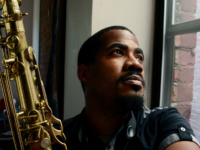James Brandon Lewis is a scholar. Of course, as a saxophonist, composer and bandleader, he’s a student of music, but he also takes an active interest in agricultural biology (George Washington Carver), molecular biology (James D. Watson), science fiction (Isaac Asimov) and visual arts (Wassily Kandinsky). All of these fields of interest and more inform his music, influenced from that world by such high authorities as Leonard Bernstein and his former mentor Charlie Haden.
Lewis distills his avid interests in these fields into a vision for each of his projects: Divine Travels is an ode to spiritualism where he introduced his “enclosed” rhythmic system, while An Unruly Manifesto was dedicated in part to surrealism. For his latest product, Molecular uses the double helix DNA component structure as a compass to guide for Lewis’ own harmonic map, and to help him fulfill this new blueprint, Lewis put together a whole new band.
Pianist Aruán Ortiz, bassist Brad Jones and drummer Chad Taylor are all respected leaders in their own right and have a ton of experience as sidemen for jazz visionaries. They can handle whatever Lewis throws at them and make it better staying within their own unique characteristics.
But back to this idea of applying the structural components of DNA to composition. What this all comes down to layman’s terms is that Lewis can create a structure where freedom can thrive. Just take a listen to “A Lotus Speaks,” an interesting, circular theme that Lewis takes outside and the whole band comes along, but easily returning to resolve the whole thing with a variation on that theme. “Of First Importance” is not just some pretty ballad, there’s forward motion that brings it from one point to another, and the enjoyment you get from it lies in that journey.
Another aspect that sets Molecular apart from just a ‘solid’ jazz record is a special group dynamic amongst guys who love to take chances and willing to take roads lass traveled. Lewis makes the 6/8 flow of “Molecular” integral to the melody, and Jones’ harmonic complement on bass gives it a nice groove, fertile ground for Ortiz and Lewis to solo over. “An Anguish Departed” smolders over a rhumba rhythm where Lewis doesn’t even enter until halfway through, but until then Ortiz is holding down the fort forcefully, displaying a unique, confident style that perfectly parallels the leader’s. “Loverly” is a delicate closing, and Jones steps up front to render a soul-probing passage.
Lewis has established his own language on the saxophone, and it’s not just note choice, but in the small yet impactful ways he plays them. He rockets out the gate for the advanced bop exercise “Helix” but what’s notable in that even in an animated state, he puts so much nuance in his notes, at one point smudging them. “Cesaire” has a Cuban feel, which suits Cuban-born Ortiz just fine, but it’s also an occasion for Lewis to play with Latin-sized passion, throwing in tantalizing hints of late-period Coltrane for the final flourish. A longer expression of this kind of passion is heard on “Neosho,” bolstered by Ortiz’s on-point comping. Lewis’ “Breaking Code” isn’t the same as Ornette Coleman’s “Lonely Woman” in structure, but possesses much of the same wistful sentiment, and his saxophone’s vibrato underscores this.
There was quite an amount of intellectual inspiration that went to the making of Molecular, but in the end, it’s really not that important to understand the non-musical, cerebral sources for the material. Lewis himself realized this: “Is the system present? Can you hear a system? And then I realized, who cares? It’s a good record.”
A very good record.
Molecular will drop in CD form on October 16, 2020 from Intakt Records. Get a download now from Bandcamp.
- Ches Smith Quartet – ‘Clone Row’ (2025) - May 30, 2025
- James Brandon Lewis Quartet – ‘Abstraction Is Deliverance’ (2025) - May 27, 2025
- Soft Machine – ‘Drop’ (1971, 2025 remaster) - May 21, 2025




